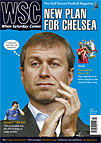 As Paul Gascoigne ploughs through the worst days of his life, he is totally and utterly alone. But then he always was, reflects Taylor Parkes
As Paul Gascoigne ploughs through the worst days of his life, he is totally and utterly alone. But then he always was, reflects Taylor Parkes
“Cries for help” don’t come any more blatant than cancelling a steak on room service but asking them to send up the knife, then attempting to drown yourself in front of the policemen who have broken down your hotel-room door, and sure enough he has been swamped in goodwill. The fact is, most of it is worse than useless (“Gareth Southgate has called on Paul Gascoigne’s friends to save the fallen star in his darkest hour,” reports the Daily Mail, as if that meant anything). While the back pages weep and fret, or offer worthless diagnoses, the news boys dig for gold: Gazza was begging in street, blared the Sun. “He tried to buy a Ferrari then his trousers fell down.” (In case we wondered, the article confirmed that “he was wearing no underwear”.) This reaction, all heat and no light, is as miserably predictable as the breakdown itself.
I’ve been watching a video called Waiting For Gascoigne, a repackaged documentary from 1996. Subtitled “from tears to triumph”, it’s a fly-on-the-wall from the 1995-96 season – the last time Gascoigne played like Gascoigne – following his progress from the move to Rangers, through the astonishing hat-trick that sealed the Scottish title, up to his tacky, doomed wedding and the almost-glories of Euro 96. Packaged as a tribute to Gazza’s magnificent rebirth, it is in fact appallingly uncomfortable viewing.
Playing, Gascoigne looks as innovative and beautifully balanced as ever; in the interview segments, while things are going well, he’s likeable and charming. Yet at the slightest stress – injured in a warm-up or suspended for a headbutt – his pale face freezes and he starts muttering, stammering, blinking back tears. “I think when you’re on your own you think a lot,” he says, lip trembling, eyes darting. “And I don’t like to think a lot.” He admits to being plagued by childhood traumas and suffering nightmares of abandonment, many of which would later come true (often because of his own behaviour). It was transparently obvious, more than a decade ago, that this was a man with serious mental-health issues and a growing drink problem. Yet at the time, those offering “help” were conspicuous by their absence – like old-time managers crippling their players with cortisone, no one thought too much about Gascoigne’s future so long as he could still flip the ball over Colin Hendry and fire it into the bottom corner.
He has never been short of sympathy, but sympathy encourages co-dependence, and it has been unedifying to watch his illness patronised (a sure-fire way to seal him inside it). In Waiting For Gascoigne, we see him filming a Walkers advert, sending himself up by blubbering glycerine tears, and it’s agonising – unable to trust himself, he opts to make a fool of himself. All anyone did was pat him on the back and pocket their percentage. Many addicts and manic depressives are not weak people; sadly, this one is. We enter the Highbury dressing room after Paul Merson’s testimonial: “that’s not good for you” frowns Merson, drily, as Gazza guzzles a post-match beer in front of him. “D’ya want one, Merse?” he grins in response. Shortly afterwards, he misses the birth of his son because he has gone out drinking.
Most ex-footballers who lack the brains for management are happy to sun their arse in Florida, but Gascoigne, who has too much and too little going on in his head, still needs an obliterating high to cope with his own existence. This much is clear. But an addictive personality does not, in itself, spawn such generally disastrous life choices, and the uncomfortable truth is that Gascoigne’s response to his illness has been anything but heroic, and the response of those around him little better. On one side, there was criticism; on the other, excuses made. Neither is any damn good.
Perhaps the discipline, camaraderie and incomparable thrill of professional football was what saved Gascoigne from himself for 30 years, but the inevitable psychological mangling may only make things harder now. It was not much better in the old days, when an ex-pro in Gascoigne’s position would have rotted away in damp boarding houses, drinking Tesco’s gin in front of a black-and-white portable (as many did). Still, there’s something about the modern game, so cut off from reality, that is uniquely destructive for the wrong personality type. And the old pals’ act is no substitute for friendship. Sure, these people care. But they don’t help.
Maybe football was the last thing Paul Gascoigne needed. As an environment in which to overcome his current problems, it couldn’t be worse.
From WSC 257 July 2008